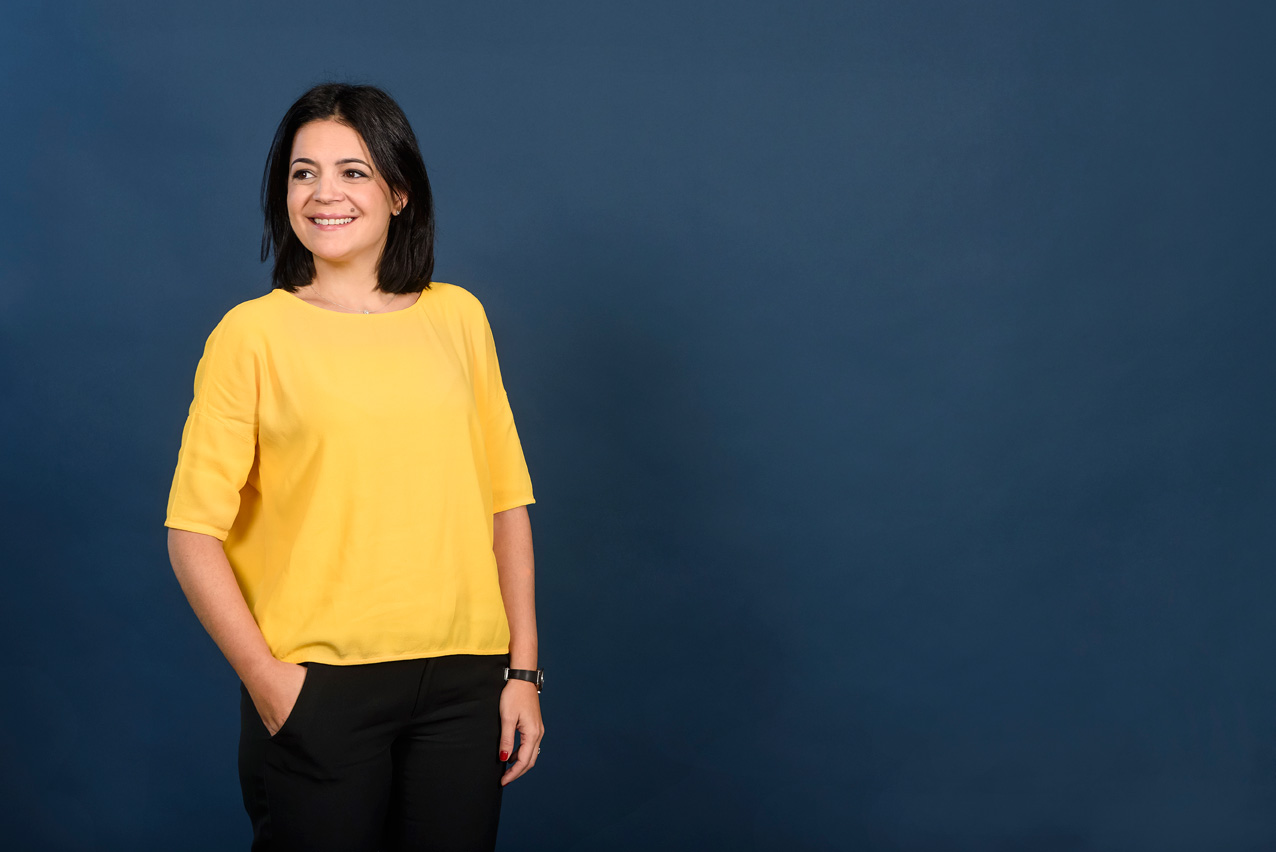When a BBVA customer, whether retail or wholesale, wants to invest in the financial markets, —for example, by buying or selling bonds, shares or currencies— there’s a special place in Ciudad BBVA in Madrid: the trading floor. It's a factory of financial market products, a space where hundreds of specialists work to meet clients’ needs with the best investment solutions. This report opens the doors to the trading floor, and introduces the team of professionals who work there, explaining the products they create and what a typical working day there is like.
This giant space has an area of 1,700 square meters and is the nerve center of the activity carried out by BBVA in the financial markets. It‘s for all types of clients, from large corporations to institutional investors, including the bank’s networks, both retail and businesses.
The floor is occupied by four hundred highly specialized employees who take part in more than 9,000 financial transactions per day. They buy shares, issue bonds, structure debt and hedge foreign-currency exposure risks. Every day there can be trading in up to 40 currencies on the floor, and the volume of client transactions can reach 18 billion euros.
An interactive tour of the trading floor
In the following video, we invite you to make an interactive visit to the trading floor. Click on the animated points that appear on the screen to learn how work is done on the trading floor and other interesting facts.
The protagonists
The experts on the trading floor are used to working across teams and in open spaces. The location of the different desks on the floor also helps the culture of cross-communication between the different teams and the efficient handling of public information.
From the origination of the product to the sale to the final client, there is a huge amount of teamwork: "It's important to trust your colleagues, breaking down walls between areas and also hierarchical barriers," explains Francisco Javier Fernández, Head of Foreign Exchange in Europe.
Most of the links in this value chain come together on the trading floor: structuring, trading, sales, research and e-Commerce. They form part of a well-oiled machine that works to offer clients the best possible product.
Sales are responsible for direct relations with clients. Traders price the transactions for sales and manage the risks derived from them. The structuring specialists design solutions that combine different instruments. Of these three teams located on the floor, more than half are sales (52%), 39% traders and 9% structuring specialists.
On the floor, as part of this value chain, is the figure of the Quant & Business Solutions specialist, who develops and implements mathematical models and analytical tools; as well as the e-Commerce expert, whose main goal is to develop, improve and distribute the offer of services and prices through the different digital channels.
Away from the floor are two other very important players: the market analysts and the originators of the transactions in primary markets, who must be separated by a "Chinese wall". This mechanism aims to prevent the occurrence of conflicts of interest between the different departments of an entity that are related to transactions with an impact on the securities markets.

"We are the client's entry point to BBVA"
Our mission consists in offering clients the product that is best adapted to their needs, always aiming to benefit them and informing them of the risks associated with each transaction.
We are organized according to the different client segments we attend: corporates, investors, institutional and the BBVA networks themselves. The product catalog covers all the underlying securities (equity, fixed income and currencies) and the different levels of complexity.
We have an in-depth knowledge of the markets and of the different financial products and operational processes and applications for preparing the information clients require.

"We set the price for the transactions"
Through the different tools and applications, we set prices consistent with the market conditions at any given time.
We also manage the risks derived from the transactions due to market movements: exchange rate rises and falls, interest rates, or the price of shares themselves. The management of these risks gives rise to the result we call "leveraging." Our activity must comply strictly with current regulations and the limitations placed on us by the Group's risk departments.
We have an in-depth knowledge of the financial markets and of the systems of market flows and activity.

"We create customized solutions for our clients""
We define and develop customized solutions, designed according to the client profile. We take into account the financial and accounting perspectives, always in line with legal, regulatory and risk requirements. In this way, the sales team has a greater variety of innovative solutions.
We have sound technical and financial knowledge, from the simplest products to the most complex and exotic derivatives, as well as knowledge of risks. It’s not uncommon for structuring specialists to master accounting or legal subjects.

"We develop mathematical models and tools"
The Quant & Business Solutions specialists are responsible for the development and implementation of mathematical models and tools that enable the analysis and management of the risk of the transactions, automate trading processes in the markets, optimize the use of resources and provide intelligence based on data. This makes us a key link in the digital transformation of the markets area.
We have extensive knowledge of financial mathematics and valuation theory, programming languages, data analysis and project management, all combined with a profound understanding of market activity and processes.

"We recommend the best investment opportunities"
Always using the public information available at any time, we carry out analysis and valuation functions of companies, sectors and the main economic variables. And as part of our work, in coordination with the sales team, we participate in commercial activity with clients, to present them our investment ideas.
We have a profound knowledge of the different markets and sectors; we handle tools and quantitative company valuation techniques. It's also important to know how to manage information sources such as Bloomberg, Reuters or other databases specific to each industry.
The financial product factory
The professionals who work on the trading floor specialize in different underlying securities, meaning financial assets (shares, bonds, currencies, interest rates, etc.) that are the object of a negotiated normalized contract in a market, and that serve as a basis for a derivatives contract and other financial products.
Each of the subsequent underlying securities will have experts in sales, trading, structuring and quants and business solutions specialized in them. These specialists are located at desks and grouped together by profiles. Thus the floor is made up of:
- Equity.
- The purchase and sale of shares.
- Credit.
- The purchase and sale of bonds, one of the products included in fixed income.
- Interest rates.
- Also included in fixed income.
- Foreign Exchange or FX.
- The purchase or sale of currencies.
All these underlying securities are negotiated in their simplest form and in the form of derivatives based on them.
Another important role in the product factory is that of the analyst who, though not physically on the floor, provides analysis of market intelligence, which is essential for the rest of the team to be able to carry out the work successfully.
Within the type of transactions carried out on the floor, there are simpler or ‘plain vanilla’ transactions; and more complex or structured transactions that combine a number of different underlying securities. In any event, the conversation begins when a client, with a need to cover, calls the sales team; or because the sales team, which knows the client’s profile very well, and the type of transactions he needs, identifies an opportunity and reports this to the client.
All the transactions that are carried out on the trading floor comply rigorously with current law and regulations in the different capital markets at any given time. The boost given by the legislators and supervisory authorities through regulations such as MiFID II within the framework of the Capital Markets Union is strongly aimed at promoting transparency and providing more and better and information to clients. This includes a clear communication to clients on prices, terms and the roles of those involved in each transaction; and also, the obligation to execute the orders in the most favorable terms for the client.
24 hours on the trading floor
BBVA has several floors similar to that of Madrid, located in London, New York, Mexico and Hong Kong. In addition, there are smaller floors with structuring and sales teams in other European cities —Milan, Paris and Dusseldorf— and in Asia. There are also floors in the Group’s main banks in Latin America: Peru, Colombia, Chile, Argentina and Venezuela.
In some cases, for products such as currencies, whose market operates 24 hours a day, five and a half days a week, clients may trade during this entire time; at the close of the European market, the trading book of positions is transferred New York and Latin America. When those markets close, it moves to Asia and returns to Madrid when the European market opens again.
"Work on the trading floor is global in coordination with the rest of the Group's floors, because our clients require a global service and knowledge, and at the same time greater specialization of the geographic areas in which BBVA operates," explains Antonio Ordás, Head of Global Markets at BBVA.
At 7 a.m., the first specialists arrive at the trading floor in Madrid. The first meeting of the day is the morning meeting, an exchange of news between the trading, sales, structuring and analysis teams. Until a few years ago it was held every day, but with the introduction of new communication channels that favor the continuous flow of information, they tend to be held less frequently: once every two days or once a week, depending on the business needs.
At this meeting, the analysts present the conclusions of their reports on the behavior of the financial markets in general, and specific underlying securities in particular; next the sales team explain the interest shown by the clients and the type of transactions they demand; the traders are those who are in direct contact with the markets, and thus explain the purchase and sale movements that they see in the different underlying securities in which they specialize.
From the time the European market opens at 9 a.m. to its closing at 5.30 p.m. the rate of work on the floor is fairly constant. However, there are three peaks of activity: the opening of the European market, the opening of the U.S. market, particularly if there is an announcement of relevant macroeconomic data, and the closing of Europe.
There are always specialists at the desks, which are never unmanned. If one has to attend a meeting, instructions are left to the rest of the team on the possible transactions that have to be executed; the same is true at lunchtime, when the members of the desks take turns leaving their posts.
It is important to note that the transactions are always worked on as a team; the profits derived from the execution of the transactions belong to the desk, never to a single specialist.
